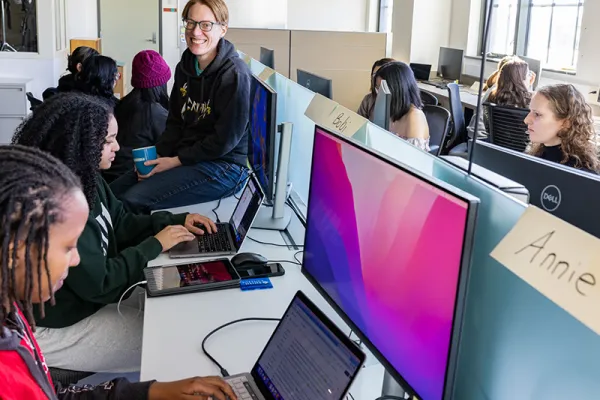Inside the Grubb Lab
Research & Inquiry
Alicia Grubb shares the secrets of building a successful software engineering lab
Published June 25, 2023
Ask students about Assistant Professor of Computer Science Alicia M. Grubb’s software engineering lab, and they will undoubtedly tell you about the camaraderie they’ve developed with their labmates.
“It’s a tightknit community that we’ve fostered,” Sonora Halili ’25 said on a recent afternoon. Natural light flooded through the lab’s big windows as classmates huddled around computer monitors filled with code, wheeling their chairs around the room to collaborate with each other. “Some of my best friends at Smith I met here.”
Evidence of that closeness pervades the room, from the pictures of former lab members on the bulletin board to the sweatshirts several students are wearing, which feature an aggressive-looking bee and the words “Grubb Lab” emblazoned across them—calling to mind a Metallica concert T-shirt.
“That’s another part of the fun,” Grubb says. “All of our logos, all of our swag, is all done by the students, for the students. They design what they want. They feel ownership.”
What makes a great lab? Giving it a name and fostering belonging is certainly part of it. Here, Grubb, who this year won a National Science Foundation CAREER Award—the agency’s most prestigious award in support of early career faculty—outlines other elements that contribute to their lab’s success.
Having personal space
“Every student needs shared space, but also their own space. They can leave a book in the lab. They can leave a sweater there because the labs are very cold. They sometimes leave stuffed animals there. It’s important that they have a space where they know they belong. It’s that sense of, ‘This is mine and so I can come here whenever I want to work. And I’m valued enough that I’m given this little piece of real estate.’”
Getting off to a good start
“At this point, we have probably a three- to four-page [onboarding] document that links to different videos, different training modules. When you join the lab, you are assigned a buddy, and that buddy is your guide, your mentor, in the first month. In the first week or so, students just go through the document line by line. It’s kind of like an instruction manual on all the different things that you need to know about being a part of the lab. The other thing that is very helpful for new folks feeling welcome is they get added to a secret Slack channel. I don’t know the name of it, and I’m not allowed on it. It’s the channel where students can ask each other questions that they’re afraid to ask me.”
Making time for fun
“In my lab, we are very serious and we are very intense. But we are also very joyful and ridiculous. And so we can work hard and write papers and produce software and do research, but we know that it’s not going to go right the first time. And we know that we’re going to, as a team, hit our heads against the wall for a couple months, and it’s going to be OK. I always tell my students, ‘You have to know what you know, know what you don’t know, and know what to ask questions about.’ So they’ll meet with me and they’ll ask me these questions and I’ll be like, ‘I don’t know, you’re now the expert. You need to come up with some wild ideas, and then we’ll go investigate them.’”
Growing slowly
“Scaling only works when it’s done intentionally. By growing a lab slowly, you can add in those practices and customize them for your individual context over time. So I can manage a lab of 14 this semester, but that’s only because we already have all of these mechanisms in place and because we understand how to work in teams; there’s a culture of everyone working in teams and everyone helping with everyone else’s success. I don’t think we could have grown and been efficient at that scale if we hadn’t done it slowly over time.”
Championing students
“When people talk about underrepresentation [in any field], there seems to be a big focus on mentorship. And I strongly believe in mentorship, but I believe that a bigger issue is what I’ll call ‘championship’ or ‘sponsorship.’ Who’s going to advocate for you when you’re not in the room, and who’s going to do the things behind the scenes to help you succeed? That’s what I spend a lot of time thinking about with my students. It’s something I know I’ve benefited from greatly with my past mentors. They were fighting for me, and I never knew until years later. They really championed my work, even when they were being extremely hard on me. That’s what I want to do for my students. I am giving them tough love sometimes, but I’m looking out for them in the things that they don’t know that they don’t know and where they’re going to fall into those traps.”
This story appears in the Summer 2023 issue of the Smith Alumnae Quarterly.
Alicia M. Grubb is a teaching scholar whose work focuses on how individuals learn, make decisions, and understand change. They address these questions in the context of empirical software engineering. Photograph by Jessica Scranton
